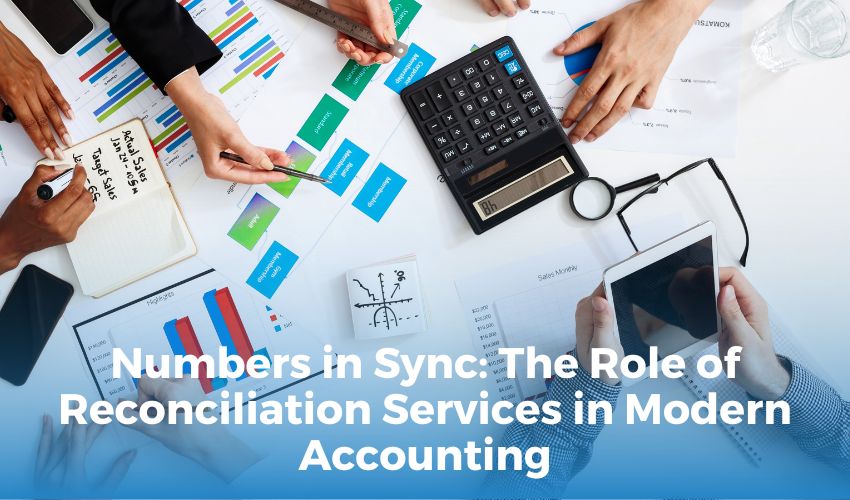

01-04-24
In today's hectic accounting industry, precision and accuracy are critical. Reconciliation services are essential to maintaining accuracy in financial records and keeping numbers in sync amidst the complexity of financial activities and data flows. The topic of this piece will be the benefits, features, and best practices of reconciliation services as they relate to modern accounting.
Understanding Reconciliation Services
To guarantee correctness and consistency, reconciliation services in usa compare and align financial records. Typically, this procedure compares statements, balances, and transactions across many accounts, including bank accounts, credit cards, invoices, and ledgers. Reconciliation services support preserving the accuracy of financial data and enable well-informed decision-making by quickly detecting and resolving differences.
Types of Reconciliation
There are several types of reconciliation services commonly performed in accounting:
Bank Reconciliation: comparing the transactions listed on the bank statement and in the company's accounting records to verify correctness and look for mistakes or inconsistencies.
Accounts Receivable Reconciliation: Verifying the accuracy of outstanding balances and that all invoices are accounted for by comparing the company's records of accounts receivable balances with client payments received.
Accounts Payable Reconciliation: Verifying accounts payable balances in the company's records with vendor invoices and payments made to ensure timely settlement and accurate financial reporting.
Inventory Reconciliation: Aligning inventory records with physical counts to ensure accuracy in inventory valuation and prevent discrepancies in financial reporting.
Importance of Reconciliation Services
Reconciliation services play a crucial role in modern accounting for several reasons:
Accuracy and Integrity: By reconciling financial records, accountants ensure that numbers are accurate and reliable, fostering trust among stakeholders and facilitating compliance with regulatory requirements.
Detection of Errors and Fraud: Reconciliation services help detect errors, discrepancies, or fraudulent activities in financial transactions, enabling prompt investigation and corrective action.
Cash Flow Management: Bank reconciliation services provide insights into cash flow, allowing businesses to monitor liquidity, identify patterns, and optimize cash management strategies.
Financial Reporting: Accurate financial records are essential for preparing financial statements, tax filings, and compliance reports. Reconciliation services ensure that financial reports reflect the true financial position of the company.
Benefits of Reconciliation Services
The benefits of reconciliation services extend beyond accuracy and compliance:
Time and Cost Savings: By automating reconciliation processes and leveraging technology, businesses can streamline operations, reduce manual errors, and save time and resources.
Improved Decision-Making: Accurate and up-to-date financial data enable informed decision-making, empowering businesses to allocate resources effectively, identify growth opportunities, and mitigate risks.
Enhanced Transparency: Reconciliation services promote transparency and accountability by providing a clear audit trail of financial transactions and adjustments.
Stakeholder Confidence: Reliable financial records instill confidence among investors, lenders, and other stakeholders, enhancing the reputation and credibility of the business.
Best Practices for Reconciliation Services
To maximize the effectiveness of reconciliation services, businesses should adopt best practices:
Regular Reconciliation: Perform reconciliation services regularly, preferably on a monthly basis, to identify and address discrepancies promptly.
Documentation and Record-Keeping: Maintain thorough documentation of reconciliation processes, adjustments, and findings for audit trail purposes and compliance with regulatory requirements.
Segregation of Duties: Implement segregation of duties to prevent conflicts of interest and ensure checks and balances in the reconciliation process.
Continuous Improvement: Continuously review and refine reconciliation processes to enhance efficiency, accuracy, and effectiveness.
Conclusion
In the intricate world of modern accounting, reconciliation services serve as the linchpin that ensures numbers are in sync and financial records are accurate. From bank reconciliation to accounts receivable and payable reconciliation, these services play a vital role in maintaining the integrity of financial data, facilitating informed decision-making, and fostering trust among stakeholders. By embracing best practices and leveraging technology, businesses can optimize reconciliation processes, streamline operations, and unlock the full potential of their financial resources. In essence, reconciliation services are not just about balancing numbers; they are about aligning financial reality with business success.
Tags : Reconciliation Services, Reconciliation Services in usa













































.jpg)
.jpg)
.jpg)
.jpg)


).jpg)














 Get A Quote
Get A Quote
Leave A Comment